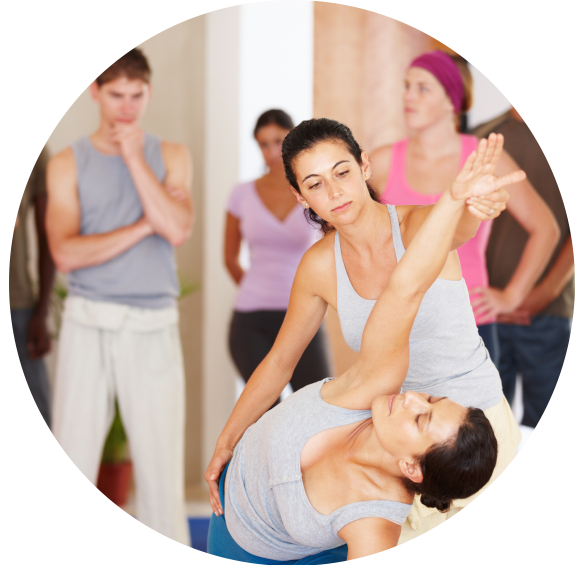
Posters at coffee shops, listings on MINDBODY, and ads on Facebook are all boasting about the next yoga workshop or masterclass. But what’s the difference between these two types of specialty yoga classes, and what is the point in teaching them as a yoga teacher?
Whether you’re a new teacher or a seasoned instructor, teaching workshops and masterclasses is an excellent way to supplement your income, expand your expertise, reach more students, and fuel your creativity.
Defining Workshop vs. Masterclass
For all intents and purposes, yoga workshops are specialty classes where learning objectives are achieved through lecture, discussion, and practice. Workshops move from theory to practice, with emphasis on understanding the theory.
Masterclasses are specialty classes in which learning objectives are achieved through in-depth practice accompanied by detailed instruction. A masterclass is like an extended practice session, except the focus is specific, and the flow may break for comments and questions.
Masterclasses are slowly on the rise across the U.S. Differentiating this type of specialty class from a workshop is important from a marketing standpoint. It allows yoga teachers to choose which of the two is better suited for their needs.
General yoga classes often require students to focus on their own practice and go inward, holding discussion to a minimum. In workshops and masterclasses, students are encouraged to openly discuss the topic and even observe one another’s bodies and practices. Specialty classes provide a more relaxed learning atmosphere where students grow together rather than individually.
Comparing Workshop vs. Masterclass
Let’s say a yoga teacher wants to teach a specialty class about shoulder articulation in asana with the following learning objectives: 1) study shoulder anatomy, 2) examine shoulder biomechanics, and 3) apply this information to yoga asanas. How would the teacher choose whether a workshop or a masterclass is best for their subject matter?
In a workshop setting, the class may start with a lecture about the anatomy and biomechanics of the shoulder and then move into a few exercises to reinforce student learning. Then, there may be discussion about various asanas and how the shoulder is articulated in each pose. The teacher could display various images or drawings and could handout packets of information with these images together with other learning materials such as graphs or research. Generally, this approach to learning is very academic.
In contrast, a masterclass class may start with a meditation, pranayama, or gentle warm ups and then move into an asana practice where the poses demonstrate the anatomy and biomechanics of the shoulder. As the poses are taught, the teacher would describe shoulder anatomy and demonstrate shoulder biomechanics. The students would reinforce what they learn through their own practice. All of the same information from the workshop format is covered, but the presentation is focused on action and experience rather than observation and lecture. A workshop is very objective where a masterclass is much more subjective. Generally, the masterclass approach to learning is experiential.
Why Teach & What To Teach
Added income is great, but money shouldn’t be the only reason to teach a specialty class. Personal growth, passion for the subject matter, and a desire to reach and serve more yoga students are all excellent reasons to offer a workshop or masterclass.
If you’re thinking about offering a workshop or masterclass, observe your students and decide what could benefit them. Draw from your personal practice and study, asking: “What do I feel confident about? What do I love about my own practice and yogic lifestyle?” Research yoga workshops and masterclasses in the area to discover voids - this can show you how others are using specialty classes to teach yogic concepts and information. Your original content will resonate more than content copied from another teacher.
Putting together a workshop or masterclass allows your creativity to shine as you explore alternative methods for teaching what you love: yoga! Workshops and masterclasses also fuel teachers, and when they return to teach their regularly scheduled classes, they have new experiences from which to draw.
Marketing & Promoting
Once you decide upon content, write a short description and title, and select the location, it’s time to advertise your class. Usually, advertising and promotion fall on the teacher presenting the workshop, although sometimes the location of the class may contribute to the creation, distribution, and/or cost of marketing materials. Either way, utilizing both print and electronic advertising is best. You can create and print flyers inexpensively and personally distribute them. Facebook makes it easy to create an event dedicated to the workshop and allows you to invite others, message attendees, and even pay to circulate the event through others’ newsfeeds. In addition, listing the workshop on other online resources like local newspaper websites, your own website, and even Craigslist may also bring more people to your workshop. [Editor’s note: if you’re a Yoga Alliance Continuing Education Provider® (YACEP), you can also market your courses on our continuing education Directory.]
One Final Tip
Yoga teaches us to be embodied and in the moment. Above all, stay present, regardless of the class being planned or being taught. Stay committed to living, teaching, and spreading of the light of yoga.
About Amanda Correa

Amanda Correa,
E-RYT 500, RPYT, YACEP, is the founder and Lead Trainer of Spira Yoga & Wellness,
RYS 200. Currently, she teaches weekly classes and workshops at local studios in her area. Having taught many different communities, she is grateful for the opportunity to serve such a wide variety of students. Amanda is repeatedly amazed by the bounty of gifts given to her by this practice and marvels at the stories of transformation from her students and colleagues.